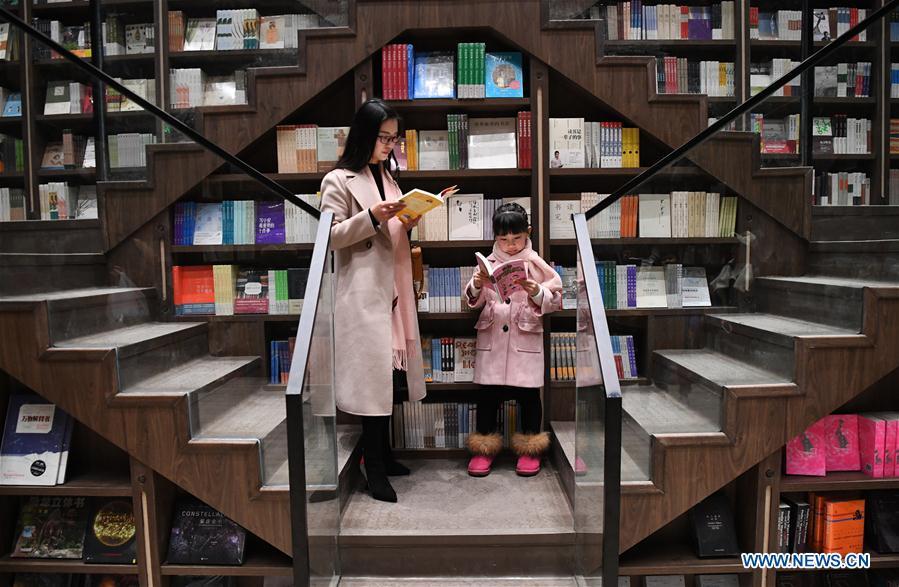
Readers are seen in a bookstore in Southwest China's Chongqing, on Jan 26, 2019. [Photo/Xinhua]
As the coronavirus epidemic spreads across the country, bookstores are investing more in the online market to further explore sales channels, according to Beijing Business Today.
Zhongshuge Bookstore, a modern and highly popular place in China in recent years, and traditional chains such as Beijing Xinhua Bookstore, Beijing Book Building and Wangfujing Bookstore have all shifted their main markets from offline to online, promoting sales through livesteaming and limited-time book discounts.
On Feb 4, Zhongshuge Bookstore made its first livesteaming on Taobao, attracting nearly 9,000 people in 4 hours, receiving more than 10,000 interactive messages and 27,000 likes.
People always kill time by reading and studying when at home, but buying books offline during the virus outbreak has been troublesome, the bookstore told Beijing Business Today. Therefore, online livestreaming plays a vital role to inform readers of new releases, while readers can also feel free to conveniently order books without going outside.
Beijing Xinhua Bookstore and Wangfujing Bookstore all launched online sales promotion since they have been temporarily shut down because of outbreak. A number of books are offered at different discounts, and online bookstores also set up a display area of books about health knowledge targeting the epidemic, with general discount of 20 percent to 30 percent.
According to the 2019 China Book Market Report released by IResearch, book retail sales from online channels have seen year-on-year growth. In 2018, the online book market achieved 5.73 million yuan, increasing 24.8 percent compared with the previous year. The agency also predicted that online sales will register 70 percent of the whole book market in 2019.
"A variety of online bookstores will bring huge competition to original e-commerce vendors, but in fact they can meet the needs of different readers and stimulate market vitality, serving as one of the supporting forces for the development of their offline physical bookstores," said Tang Yong, a senior publisher, to Beijing Business Today.
Wei Pengju, head of the National Center of Cultural Innovational Research at the Central University of Finance and Economics, noted that it may take a long time for the business of offline bookstores to recover after the outbreak.
"When the epidemic disappears, offline entities still have to go through a period during which consumers gradually overcome their psychological burden - the fear of going to crowded places - and regain social confidence. Therefore, we will still need the online platforms as a supplement," he said.
Although the boom of online consumption can make up for part of the loss when offline stores shut down during epidemic, booksellers still face severe managing burdens including manpower expenses as well as rental and property costs.
However, it's worth noting that Beijing authorities have just introduced several measures to help enterprises tide over difficulties.
The Beijing Municipal Commission of Development & Reform said it would encourage large commercial buildings, shopping malls and market operators to reduce rental burdens for small, medium and micro tenants during the outbreak, and give appropriate financial subsidies to those who adopt this policy.
Apart from that, the city has also announced it will delay the social insurance payment date, extending the collection period to the end of March, while companies in some of the worst-hitsectors can extend the collection period to the end of July.
(Source: chinadaily.com.cn)




 A single purchase
A single purchase









